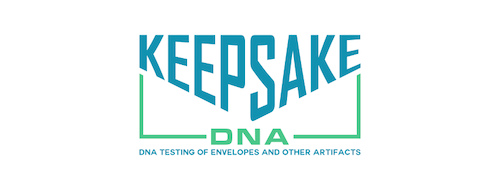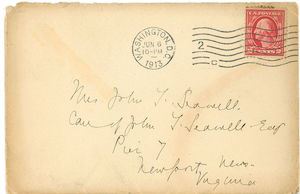I was wandering up and down the aisles at RootsTech 2023 when the banner at one particular exhibit booth caught my eye. It stated, "DNA Testing of Envelopes and Other Artifacts." Really? At a price that appeals to private genealogists?
I know that testing for DNA on sealed envelopes, used styrofoam coffee cups, and similar objects has been available for years but at prohibitive prices that limit their use to law enforcement officials investigating serious crimes.
I had to find out more so I stopped and had a conversation with the lady in the booth. I was told that such testing is available today to private genealogists, it really works, and that prices are certainly not cheap but are lower-priced than I had imagined (more on that later).

Keepsake DNA is a non-profit company that will appeal to genealogists and others who want to decode the DNA of someone else. Most such tests involve determining the DNA of someone who is now deceased, such as a grandparent or someone similar. For instance, decoding family DNA from love letters that grandpa wrote home while serving in "the war." That's one such use, I am sure there must be dozens of other possible uses.
Yes, you can now unlock the mysteries of your family’s ancestry and fill the holes in your genealogical tree through the testing of ancestral artifacts such as old envelopes, watches, hats, hair, etc.
That's right: the exhibit booth banner said "DNA Testing of Envelopes and Other Artifacts" and the list of "other artifacts" is extensive. Not only can the company test the saliva used to seal envelopes of letters sent by soldiers, but all sorts of other ancestral items can reveal DNA, including:
- hair brushes
- hair samples
- false teeth
- hats
- old envelopes
- wrist watches
- jewelry
- shoes
- shirts
- toothbrushes
- tobacco pipes
- bandages
- artificial limbs
- eyeglasses
- chewed gum
- hand tools
and many other items that were in close contact with the deceased while he or she was still alive.
Testing will be conducted by an accredited United States lab with seasoned personnel and state of the art technology.
All in all, this might solve some mysteries that could not be solved in any other method.
Methodology
First, the lab identifies the best locations for possible DNA and takes a sample (swab/cutting etc.) of that material. Some examples of this are as follows:
- Envelopes: Cutting of the back flap and/or stamp.
- Hat: Swabbing of the interior band.
- Shirt: Swabbing and/or cutting of material under the arm.
- Earring: Swabbing of post/clasp.
- Shoes: Swabbing of interior sole.
Some specific sample types also require pre-processing to obtain enough DNA to move forward. For teeth and/or bones, a special instrument called the Qiagen Tissuelyser II is used to very carefully pulverize the material into a powder before it can move on in the process.
Biological material trapped in porous materials like clothing or hats may be collected with a specialized tool called the MVAC that can obtain much more DNA than traditional methods.
Next, the lab extracts the potential DNA.
 The DNA obtained from the first test(s) is run on one of two DNA sequencing instruments that precisely identifies the specific DNA "code" for each sample. That DNA "code" is then transformed into a specific output file that is comprised of tens to hundreds of thousands of genealogy informative Single Nucleotide Polymorphisms (SNPs, pronounced "snips"). These genetic genealogy SNPs are identified and documented in a electronic file that is compatible with GEDMatch and/or Family Tree DNA genetic genealogy databases.
The DNA obtained from the first test(s) is run on one of two DNA sequencing instruments that precisely identifies the specific DNA "code" for each sample. That DNA "code" is then transformed into a specific output file that is comprised of tens to hundreds of thousands of genealogy informative Single Nucleotide Polymorphisms (SNPs, pronounced "snips"). These genetic genealogy SNPs are identified and documented in a electronic file that is compatible with GEDMatch and/or Family Tree DNA genetic genealogy databases.
A Verogen FGx Forensic Sequencing device is used on some DNA samples. The instrument is exclusively distributed by Verogen who, in 2019, bought GEDmatch.com. GEDmatch is a popular DNA database to which genealogists can upload profiles to compare with other researchers’ profiles. For example, someone who tests with Ancestry.com, MyHeritage, or 23andMe can upload those profiles to GEDmatch.
Pricing
Prices for all this testing and the use of expensive, high-tech devices isn't exactly cheap. but is less than I had initially assumed it would be, It is also much less than such testing would have cost a few years ago.
Prices are somewhat customized after discussing all information with the potential customer. In short, each case is different. The folks at Keepsake DNA will make a determination of the chances of success in obtaining useable DNA and the price will vary depending upon the difficulties expected. You can learn more at https://www.intermountainforensics.com/keepsakedna and then click on "Pricing."
For more information about Keepsake DNA and the odds of success of extracting DNA information from your ancestral item, go to: https://www.intermountainforensics.com/keepsakedna.